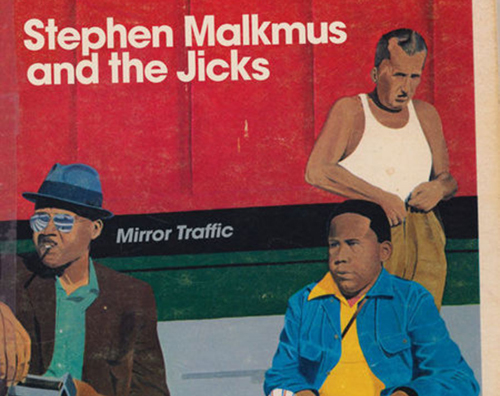I’ve already listened to all of Stephen Malkmus and The Jicks’ new album Mirror Traffic twice, first in the car, on my hundred-minute drive back from Phoenix, and again on my home stereo, before my thinking about it starts to find traction. Part of me is glad that the songs are shorter and less solo-inclined than was the case on Mirror Traffic’s predecessors. But even the gravel strewn across their surface — a missed beat here, a splash of distortion there — doesn’t diminish their slipperiness. I have to proceed with care.
To be sure, some details catch my ear from the get-go: the rollicking cheer of the treble-enhanced guitar part that leads off “Stick Figures in Love”; the French horn seamlessly integrated into the folk rock sound of “No One Is (As I Are Be)”; the pedal steel that gives “Long Hard Book” a wistful air. Not surprisingly, these touches carry the imprimatur of the album’s celebrity producer Beck. I contemplate them warily, not sure if I want my favorite songwriter to be dressed in another man’s wardrobe. Could this be one of those cases where an underselling mid-career artist submits to a make-over in the hopes of making real money?
Probably not, I realize. Had Malkmus tried this approach in the early 2000s, before record sales had plummeted through the floor, the charge might have stuck. These days, though, it’s only artists of the stature of Lady Gaga who pull in significant revenue from an album. For middle-aged indie rockers like Malkmus, there are only two reliable ways to balance the books: tour heavily and license songs for films, television shows and commercials. In all likelihood, choosing Beck to produce Mirror Traffic was simply a way to get some distance from his previous releases.
If that was his goal, Mirror Traffic is a success. The fact that I’m struggling to feel comfortable with the album testifies as much. Having finally gotten used to the meandering instrumental passages interspersed throughout his last three solo efforts, with their aura of pastoral insouciance, it’s a shock to listen to a record with six songs under three minutes. Like the album’s back cover, which features black text on a plain white background and “retro” biographies of The Jicks’ members, this brevity suggests a back-to-basics approach. Malkmus means to break with his previous work, at least to a degree.
But that’s where things get complicated. Because for me and other devoted fans of Pavement, the critically revered band Malkmus led throughout the 1990s, the basics we have secretly longed for him to get back to are not Sun Records’ finest but shambling noise pop masterpieces like “Box Elder”, “Summer Babe”, “Frontwards” and “Cut Your Hair”. Not coincidentally, those were the kind of songs that predominated on Pavement’s March, 2010 collection Quarantine the Past and which audiences called for most insistently on the band’s subsequent reunion tour.
So while I’m remarking the ways in which Mirror Traffic marks a break with Malkmus’s earlier work as a solo artist, I can’t help but notice that this departure also feels like a return to the songwriting he perfected in Pavement. Curiously, this realization also makes me uneasy. I worry that the album might be trying too hard to please people like me, whose enthusiasm for his post-Pavement work will always be discolored by nostalgia for the brilliance that preceded it.
Malkmus has had to cope with the burden of this archetype since Pavement first started to attract media coverage. This is not to imply that the critics have been unkind to him. But there has been a consistent disconnect between the way in which his music is written about and the way it plays for his devoted fans. Because once someone has fully committed to its pleasures, the usual standards of evaluation do not apply.
The detours Malkmus takes with both his voice and guitar are often emphasized more than a song’s basic structure. Tracks begin at an agonizingly slow pace or end so abruptly that it sounds like someone shut the stereo off. His inimitable lyrics are even less likely to play by the rules. Because Malkmus has a special gift for pronouncing his words so that they can be understood on first or second hearing, listeners are able to learn lines rapidly despite his refusal to provide an official lyrics sheet. But it’s rare that a person can piece those lines together into something complete without a great deal of effort.
Like the work of the poet John Ashbery, whom Malkmus once claimed as an influence, he practices an aesthetics of the fragment. The more closely you examine the lyrics to a song, the more likely they are to disintegrate into randomness. From a distance, though, when accompanied by his music, they resonate with meaning that can never be captured on paper. To be sure, this is the fate of most song lyrics. In the case of Malkmus, though, who is famous for flaunting his dexterity with words, the realization may be troubling. Why doesn’t he put that vocabulary to use communicating messages that stand on their own merits? Why doesn’t he use his surfeit of talent to get a serious point across?
It’s no accident that reviews of Mirror Traffic have focused on the song “Senator”, which at first seems to be a fairly straightforward indictment of American society’s ills. “I know what the senator wants/What the senator wants is a blow job,” he sings with uncharacteristic intensity. But the final stanza turns dilutes this critique of Washington by literally changing the subject. “I know what everyone wants/What everyone wants is a blow job.”
That refusal to stay on a clearly defined side is frustrating for those who want someone with such obvious talent to be a political spokesperson. But like the post-electrification Bob Dylan, whom he convincingly imitated on the soundtrack for the Todd Haynes film I’m Not There, Malkmus is wary of the limitations that come with such a role. Even when he provides lines to identify with, he takes care to facilitate their dismantling as well.
Remembering this quality is what makes it possible for me to start hearing Mirror Traffic from the inside. Because as memorable as that reference to a blow job may be, it’s clearly an outlier. The album doesn’t represent a change of heart. On the contrary, the majority of its songs are preoccupied with the problem of pointing fingers. Identifying what the senator wants may be satisfying, but we have to acknowledge that his failings are no different from our own.
Trying to ascribe an overarching theme to Mirror Traffice would be a fool’s errand. But if there is anything to connect its songs together, it is Malkmus’s concern with the problem of being treated as a role model. When we identify someone or something as a problem, we inevitably identify with the position from which it can be seen as such. Our desire is inevitably mobilized in that process, no matter how fervently we aspire to be objective.
In other words, the “blow job” we want is inextricably bound up with this the impulse to let someone speak on our behalf. Whether the representative we choose is a senator or a rock musician, we live vicariously through them. We can indict them for falling short of our ideals, but that judgment is ultimately a self-indictment as well.
The title of Mirror Traffic appears to reference this dynamic. Certainly, many of the album’s songs are concerned with disrupting it. I’m sure that’s one of the reasons why they made me uncomfortable at first. But once I realize that I’m not only listening to a break-up record, but listening to a record in which the artist is trying to break up with me, its true strength becomes apparent.
“Share the Red” is the first song to song to catch my attention after this interpretation comes to mind. “Have you no ears?/Have you no eyes?/You’ve got no idea how to survive?” Ambling along at the leisurely pace Malkmus is known for, this critique doesn’t seem particularly pointed. Still, I can feel the edge. Maybe it’s just too close to home, an indictment of mid-life crisis pertinent to my own situation.
My interest piqued, I begin to listen with more focus. “Before 28” unfolds at a similar tempo, but less smoothly. The stuttering rhythm makes sense, since this is a song about difficulty of getting along with others. “I can see the mystery/Of you and me/We never quite add up,” Malkmus begins, sounding like he’s struggling to find time to breathe amid the flow of words. “No one is your perfect fit/I do not believe in that shit/Don’t you know that every bubble bursts?” The awkwardness of the meter couples with the exaggerated pre-school rhyme scheme to prove this point at the level of form. When we try too hard to cover over our differences, the results are rarely what we’ve hoped they would be.
Soon, I’m pondering the relationships between songs. “All Over Gently” pursues the disillusionment of “Before 28” to its logical outcome. It’s the chorus that wins me over, the sweet rush of the music serving as counterpoint to words that he manages to make simultaneously sincere and ironic. “There’s been some soft grass grown between us/Yeah, yeah, yeah/But when they talk about bad blood, they don’t mean us.”
At this point, the Pavement fan in me can’t help but wonder whether Mirror Traffic represents Malkmus’s attempt to come to terms with the band’s legacy. For over a decade and four albums’ worth of music, he has done his best to avoid the subject. His first solo release, 2001’s Stephen Malkmus, did contain the wry, bouncy “Jenny and the Ess-Dog”, a song about a relationship that was doomed to fail. But it would take a very strong allegorical reading to interpret it as a précis of his years in Pavement.
Why would Malkmus need to break up with Pavement now? Yes, the band did go on a reunion tour last year, no doubt stirring up feelings that had been lying dormant. In the end, though, it wasn’t the relationship between members of the band that was the biggest issue, but their relationship with the audience. All those nostalgia-seeking thirty and forty-somethings, myself included, were collectively demonstrating a refusal to live in the present.
Mirror Traffic may sound more like Pavement then Malkmus’s previous solo albums because preparing for the reunion tour reminded him how to play that way. But his lyrics attest to the second-guessing that effort inspired. Hearing the songs for the first few times is like running into an old flame. But listening to them closely reminds us why the relationship had to end. That’s a hard lesson, to be sure, but one that is ultimately far more rewarding than just pandering to our nostalgia.





